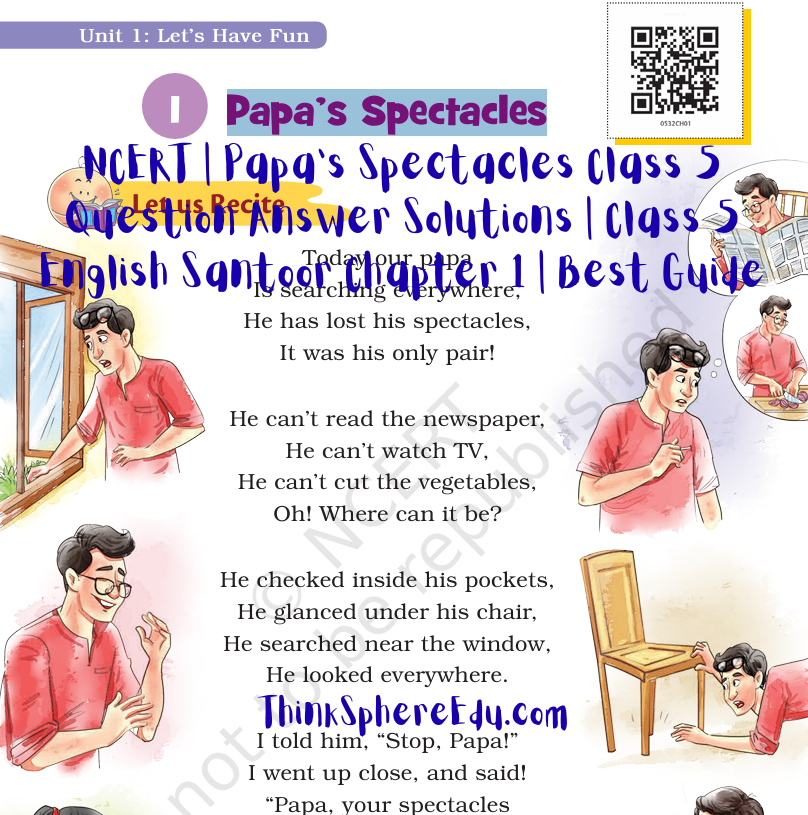
NCERT | Santoor | Papa’s Spectacles Class 5 Question Answer Solutions is essential for young learners to build a strong foundation in the subject, and NCERT Papa’s Spectacles Class 5 Worksheet With Answers. Understanding the chapter thoroughly helps students grasp key concepts, improve comprehension, and perform well in exams.
In this article, NCERT Santoor Papa’s Spectacles Class 5 Questions And Answers Solved | Santoor, we provide detailed Santoor | NCERT Papa’s Spectacles Class 5 Extra Questions and Answers to make learning easier and more effective. Whether you are a student looking for well-explained solutions or a parent guiding your child, this guide will be a helpful resource for mastering the chapter with confidence. Also, we will include Santoor Papa’s Spectacles Question Answer pdf Class 5 Solved Meaning In Hindi and Papa’s Spectacles Summary.
- Papa’s Spectacles Class 5 Question Answer Solutions | Class 5 English Santoor Chapter 1 Question Answer | NCERT
- Papa’s Spectacles Summary in English (Papa’s Spectacles Class 5 Question Answer)
- Papa’s Spectacles Summary in Hindi (Papa’s Spectacles Class 5 Question Answer)
- Papa’s Spectacles Class 5 Hindi Meaning (Papa’s Spectacles Class 5 Question Answer)
- Let us Think (Papa’s Spectacles Class 5 Question Answer)
- Let us Learn (Papa’s Spectacles Class 5 Question Answer)
- A. Look at the words in each group. Arrange them in ascending order (Write the smallest or lightest object first and the biggest or heaviest last.)
- B. Fill in the blanks and complete the phrases.
- C. Encircle the word that is spelt correctly. One has been done for you.
- D. Complete the story using the correct prepositions.
- E. Use the clues given below to complete the crossword puzzle!
- Let us Listen (Papa’s Spectacles Question Answer)
- Let us Write (Papa’s Spectacles Question Answer)
- Let us Write
- Papa’s Spectacles Extra Question Answers Class 5 Note
Papa’s Spectacles Class 5 Question Answer Solutions | Class 5 English Santoor Chapter 1 Question Answer | NCERT
Papa’s Spectacles Summary in English (Papa’s Spectacles Class 5 Question Answer)
The poem “Papa’s Spectacles” is very humorous and touching at the same time. It recites the episode of a father losing his spectacles and making a thorough search for them in all possible and even improbable places. His empty pockets, under a chair, and the windowsill are all explored, but unfortunately, he is still spectacles-less. His predicament is such that he cannot read the paper, watch TV, or even cut vegetables.
Finally, his offsprings tell him to stop looking and point out that the glasses are really on his head! Through the poem, we learn to be patient and thorough instead of getting anxious right away. The poem also captures the endearing and mischievous relationship between the father and child.
Papa’s Spectacles Summary in Hindi (Papa’s Spectacles Class 5 Question Answer)
“पापा का चश्मा” कविता बेहद हास्यप्रद और मार्मिक है। यह एक पिता के चश्मे के खो जाने और उसे हर संभव और यहाँ तक कि असंभव जगहों पर ढूँढ़ने की कहानी कहती है। उसकी खाली जेबों, कुर्सी के नीचे और खिड़की की चौखट पर, सब कुछ खंगाला जाता है, लेकिन बदकिस्मती से, उसके पास अभी भी चश्मा नहीं है। उसकी हालत ऐसी है कि वह अखबार नहीं पढ़ सकता, टीवी नहीं देख सकता, यहाँ तक कि सब्ज़ियाँ भी नहीं काट सकता।
आखिरकार, उसके बच्चे उसे देखना बंद करने के लिए कहते हैं और बताते हैं कि चश्मा असल में उसके सिर पर है! इस कविता के माध्यम से, हम तुरंत घबराने के बजाय धैर्य और गहनता से काम लेना सीखते हैं। कविता पिता और बच्चे के बीच के प्यारे और शरारती रिश्ते को भी दर्शाती है।
Papa’s Spectacles Class 5 Hindi Meaning (Papa’s Spectacles Class 5 Question Answer)
Stanza – 1
आज हमारे पापा हर जगह खोज रहे हैं,
उनका चश्मा खो गया है,
वो उनका एकमात्र चश्मा था!
(यानि पापा के पास सिर्फ एक ही चश्मा था और वो अब नहीं मिल रहा है।)
Stanza – 2
वो अख़बार नहीं पढ़ पा रहे हैं,
टीवी नहीं देख पा रहे हैं,
सब्ज़ियाँ भी नहीं काट पा रहे हैं,
ओह! वो चश्मा आखिर कहाँ गया होगा?
(पापा अपने रोज़मर्रा के काम नहीं कर पा रहे हैं क्योंकि चश्मा गायब है।)
Stanza – 3
उन्होंने अपनी जेबों में देखा,
कुर्सी के नीचे झाँका,
खिड़की के पास ढूँढा,
उन्होंने हर जगह खोज लिया।
(पापा ने चश्मा ढूँढने की हर कोशिश कर ली, पर फिर भी नहीं मिला।)
Stanza – 4
मैंने कहा, “रुकिए पापा!”
मैं पास जाकर बोली,
“पापा, आपका चश्मा तो
आपके सिर पर ही है!”
(बेटा/बेटी पापा को बताता है कि चश्मा तो उनके सिर पर ही रखा है।)
Let us Think (Papa’s Spectacles Class 5 Question Answer)
A. Answer the following questions.
1. What is Papa searching for?
Answer: Papa is searching for his spectacles.
2. What are the possible places where Papa can find it?
Answer: Papa can find it inside his pockets, under his chair, or near the window.
3. At last, where does Papa find his lost item?
Answer: At last, Papa finds his spectacles on his own head.
B. Think and discuss
1. Apart from reading, guess some other chores that Papa cannot do without the spectacles.
Answer: Apart from reading, Papa cannot watch TV, cut vegetables, or do any work that needs clear vision without his spectacles.
2. What makes your papa happy?
Answer: My papa feels happy when he finds his lost spectacles and spends time with his family.
3. Make a list of things as instructed below.
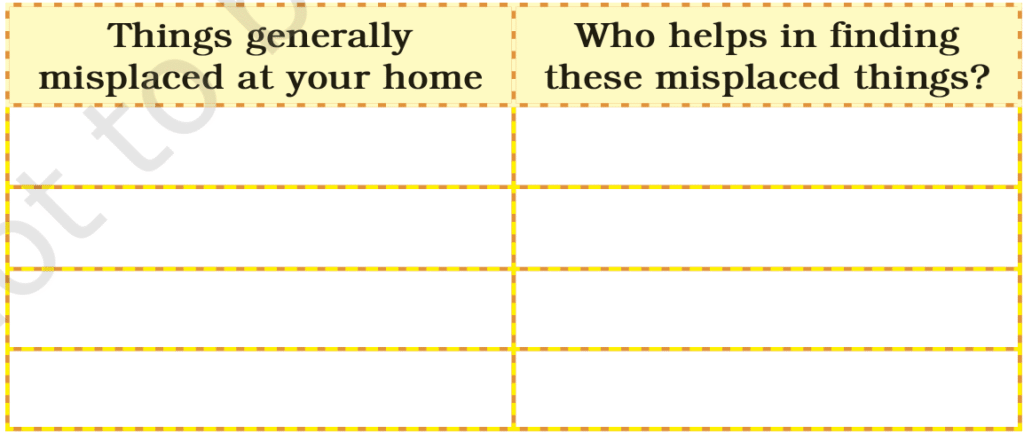
How would you express your gratitude to them?
Answer:
| Things generally misplaced at your home | Who helps in finding these misplaced things? |
|---|---|
| Spectacles | My Mother |
| TV Remote | My Sister |
| Keys | My Brother |
| Hairbrush | My Mother |
I would say “Thank you” to my mother, father, and brother for helping me find the misplaced things. I would also give them a big smile and help them whenever they need me.
Let us Learn (Papa’s Spectacles Class 5 Question Answer)
A. Look at the words in each group. Arrange them in ascending order (Write the smallest or lightest object first and the biggest or heaviest last.)
1. Towel, Sari, Handkerchief, Bedsheet
Answer: Handkerchief, Towel, Sari, Bedsheet
2. Apple, Strawberry, Cherry, Watermelon
Answer: Cherry, Strawberry, Apple, Watermelon
3. Twenty-nine, Fourteen, Ninety-one, Forty-seven
Answer: Fourteen, Twenty-nine, Forty-seven, Ninety-one
4. Hen, Crow, Sparrow, Eagle
Answer: Sparrow, Crow, Hen, Eagle
5. Ox, Rabbit, Elephant, Squirrel
Answer: Squirrel, Rabbit, Ox, Elephant
Write two examples more, following the same pattern.
Answer: Pebble, Apple, Football, Bicycle | and |Ant, Mouse, Goat, Cow
B. Fill in the blanks and complete the phrases.
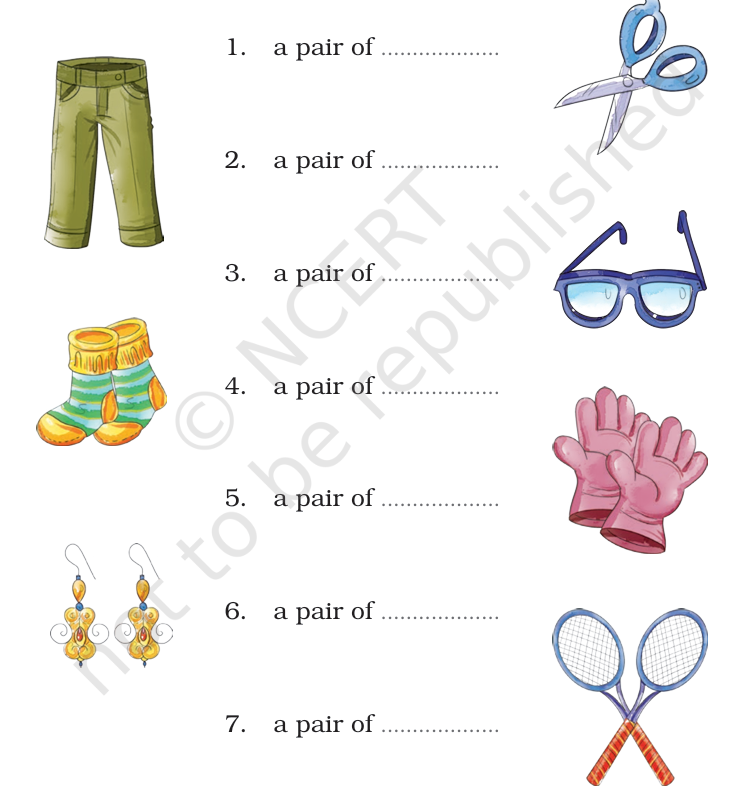
Answer:
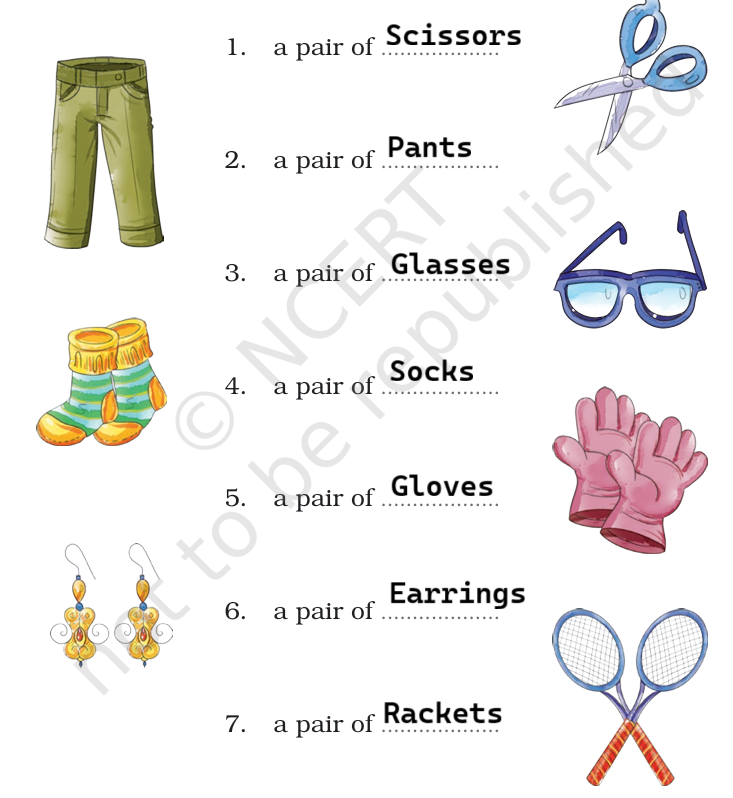
C. Encircle the word that is spelt correctly. One has been done for you.
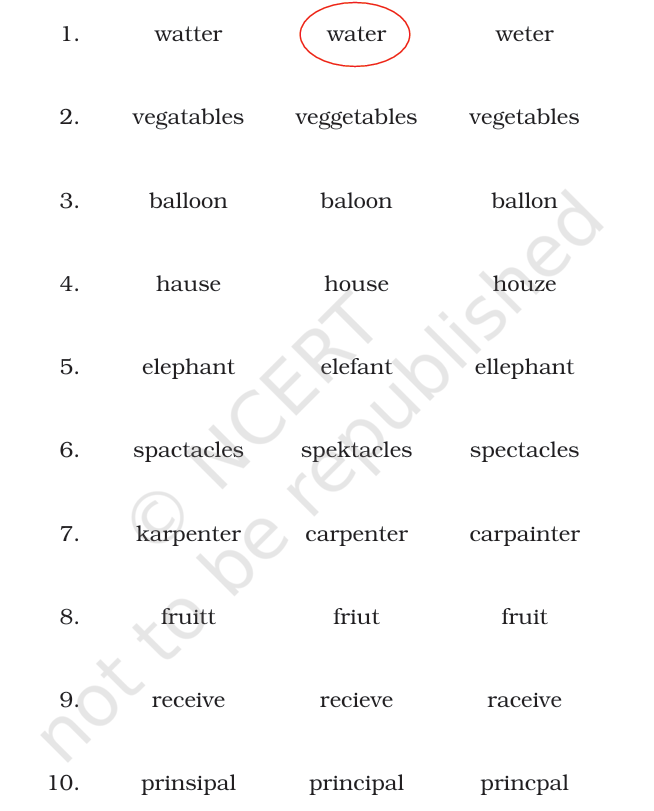
Answer:
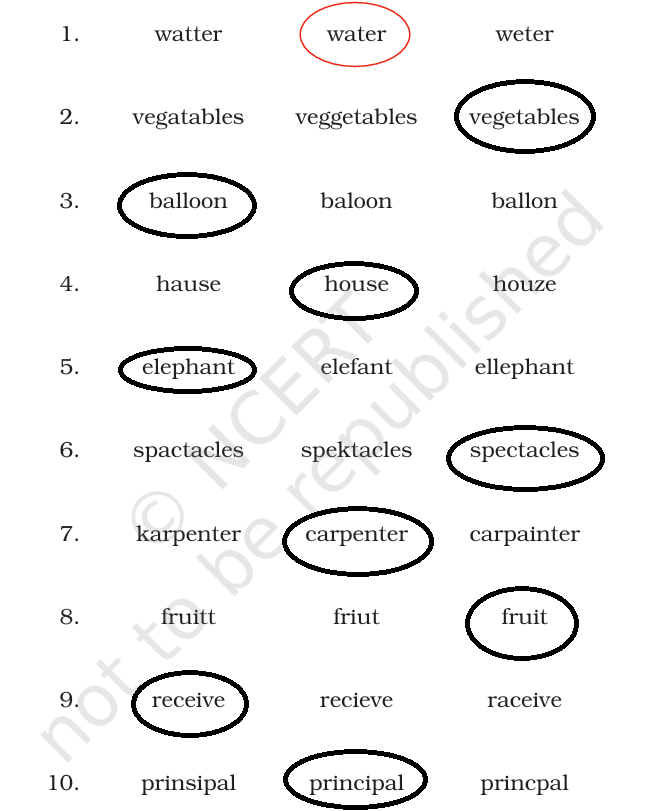
D. Complete the story using the correct prepositions.
around, after, before, in, above, on, among
My father has a habit of keeping his spectacles _____________ random places. Last week, he could
not find his spectacles and looked ____________ the house. We checked the big box that reached
__________ our waists. My father looked for the spectacles ___________ the newspapers kept
_________ the table. He continued searching for two hours _____________ finally giving up. He
sat down on the bed ____________ giving one final look to the room and said with a sigh, ‘Looks like
it is time to get a new pair.’
Answer:
My father has a habit of keeping his spectacles in random places. Last week, he could not find his spectacles and looked around the house. We checked the big box that reached above our waists. My father looked for the spectacles among the newspapers kept on the table. He continued searching for two hours before finally giving up. He sat down on the bed after giving one final look to the room and said with a sigh, ‘Looks like it is time to get a new pair.’
E. Use the clues given below to complete the crossword puzzle!
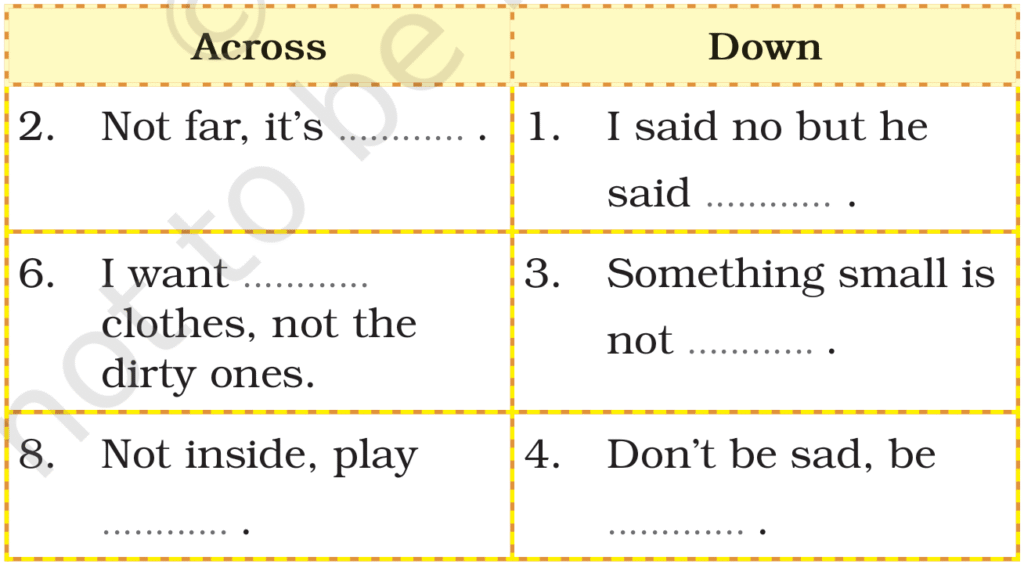
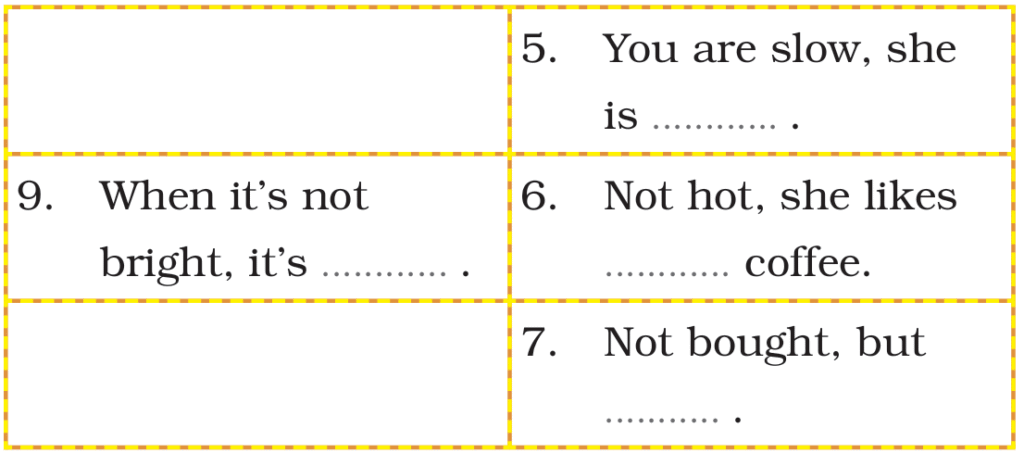
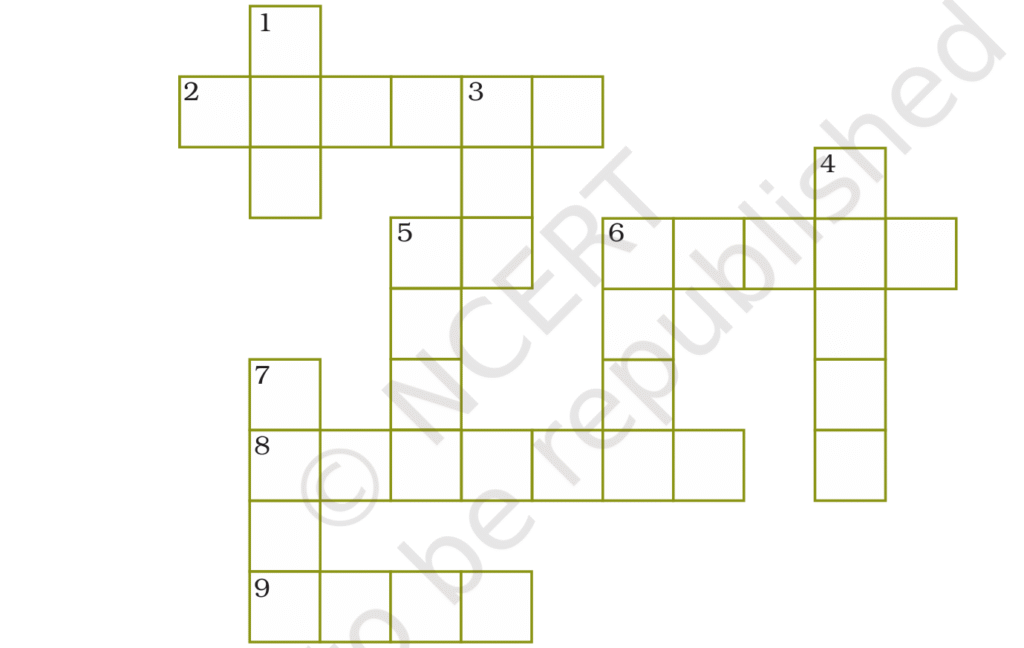
Answer:
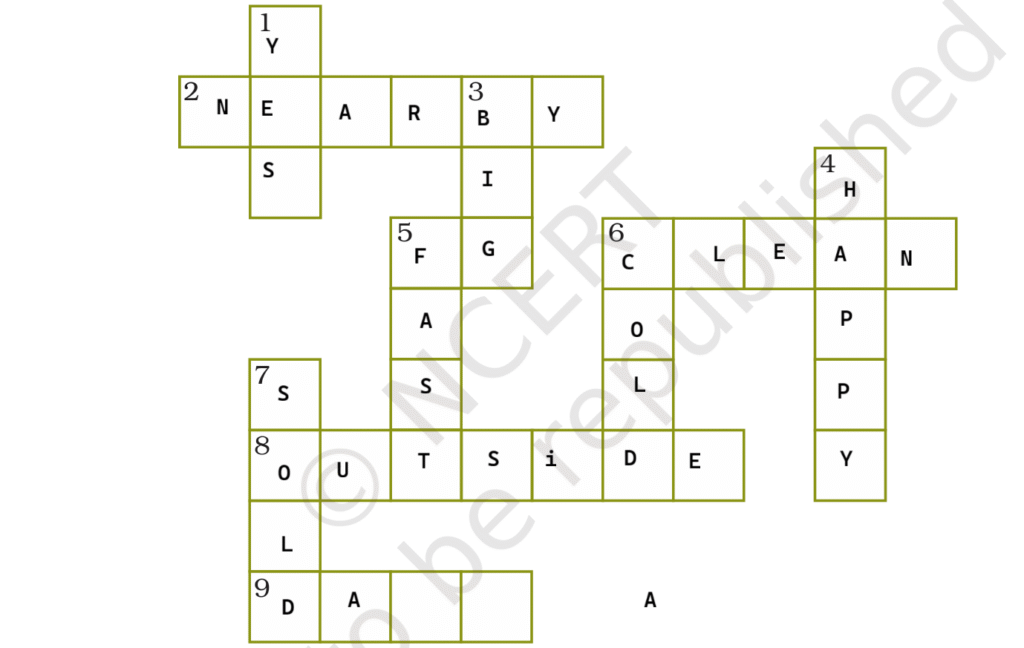
Let us Listen (Papa’s Spectacles Question Answer)
Your teacher will read aloud a few word pairs. Listen carefully and encircle pairs in which the words sound different.
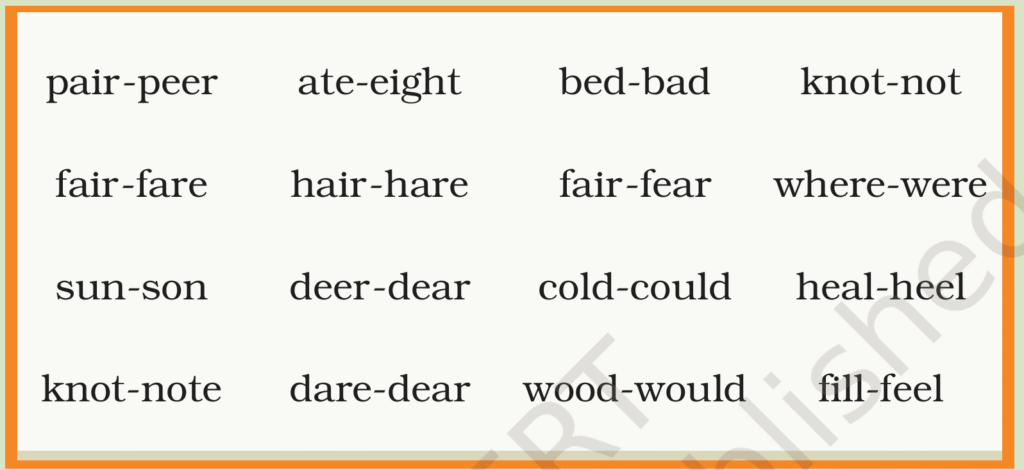
Answer:
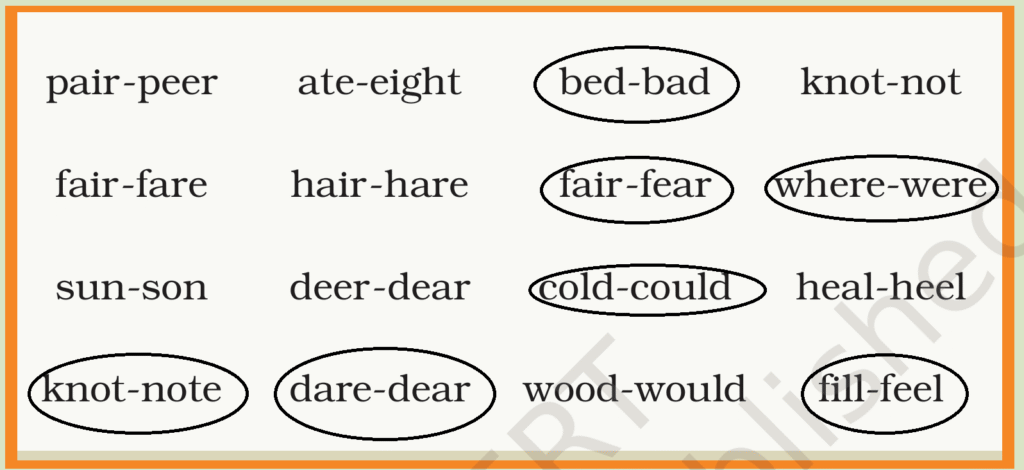
Let us Write (Papa’s Spectacles Question Answer)
Write the poem Papa’s Spectacles in the form of a story in your notebook. Share your story with the class. You may start like this.
Answer:
Today my father is unhappy. He has lost his spectacles, and without them he cannot do anything properly. He tried to read the newspaper, but the words looked blurry. He tried to watch TV, but he could not see the screen clearly. He even tried to cut vegetables, but that too became difficult.
So, Papa started searching for his spectacles. He looked inside his pockets. He bent down and checked under his chair. Then he walked to the window and searched near it. He looked all around the house, but the spectacles were nowhere to be found. Papa became tired and worried.
I went close to him and said, “Stop, Papa. Don’t worry.” Then I noticed something funny. The spectacles were actually on top of his head! I laughed and said, “Papa, your spectacles are right there on your head!”
Papa touched his head and started laughing too. He felt happy again, and we both enjoyed the funny moment.
Let us Write
A. Fun With Matchsticks
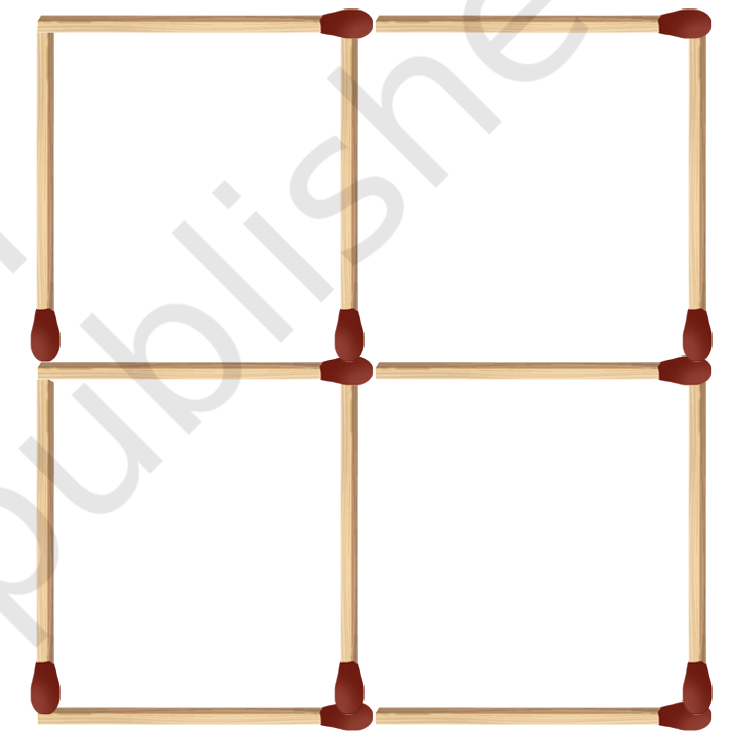
Move 3 matchsticks to make 3 squares.
Answer:
Do it by yourself and let me know in the comment section.
B. Look at the flame
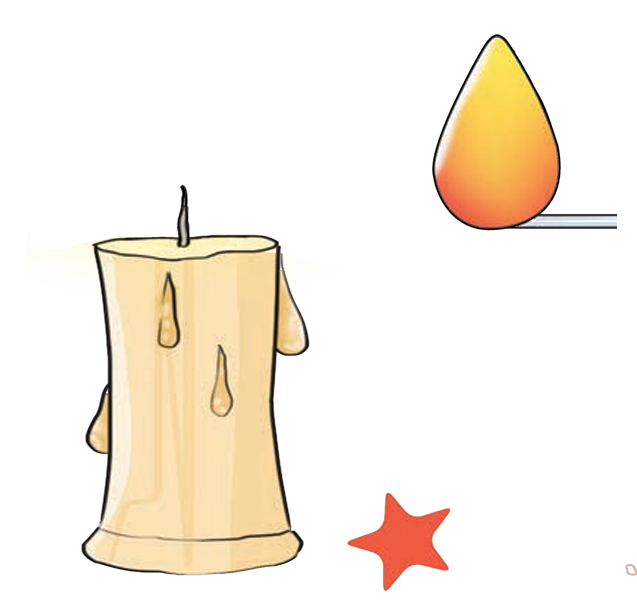
Touch the red star with the tip of your nose, and look at the candle. And lo! It starts burning!
Answer:
Do it by yourself and let me know in the comment section.
C. Look carefully. Can you find ‘d’ ?
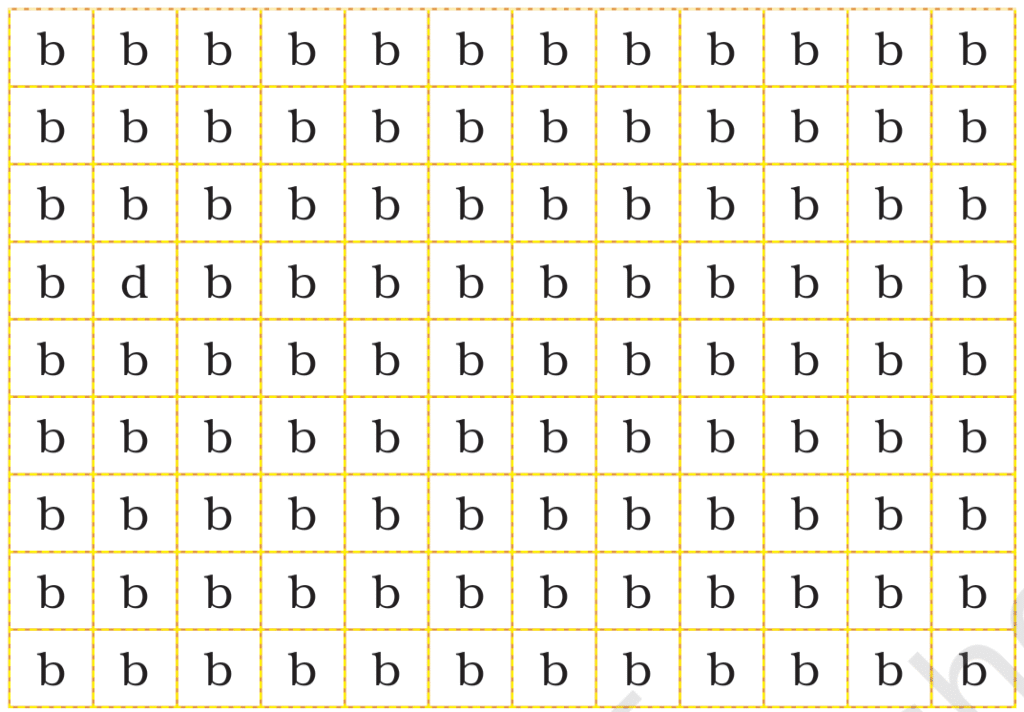
Answer: Yes, there is 1 d. I will circle this d.
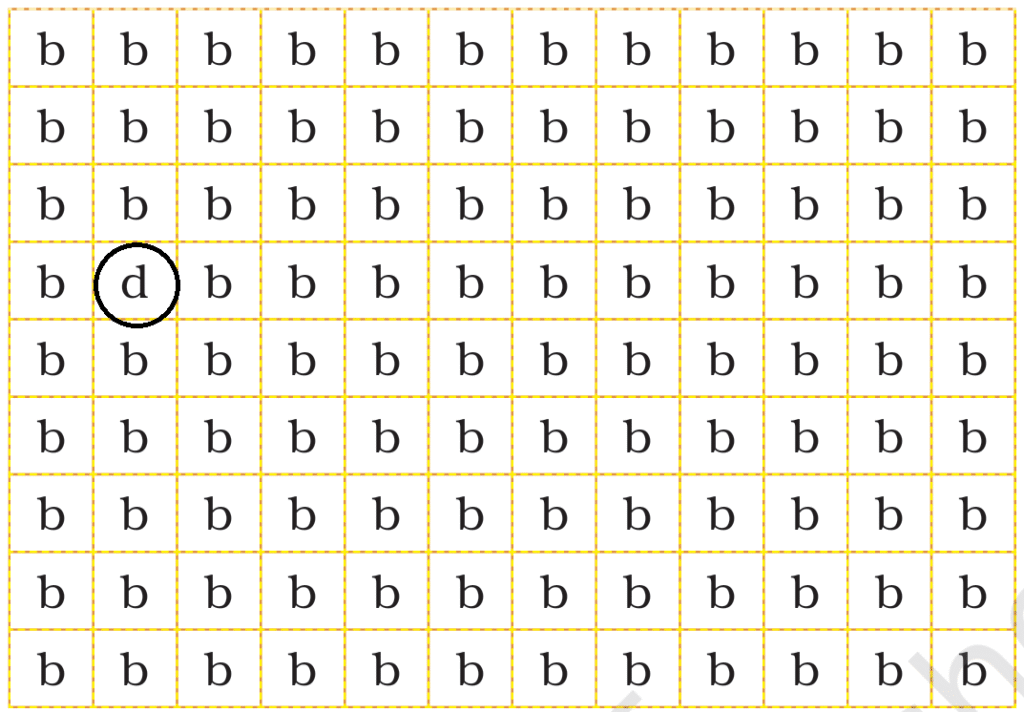
Papa’s Spectacles Extra Question Answers Class 5 Note
1. What is Papa searching for?
Answer: Papa is searching for his spectacles.
2. Why can’t Papa watch TV or read the newspaper?
Answer: Papa cannot watch TV or read the newspaper because he has lost his spectacles.
3. Where did Papa search for his spectacles?
Answer: Papa searched inside his pockets, under his chair, and near the window.
4. Who helped Papa find the spectacles?
Answer: His child helped Papa find the spectacles.
5. Where were the spectacles in the end?
Answer: In the end, the spectacles were on Papa’s head.
6. What does this poem teach us?
Answer: The poem teaches us to stay calm and look carefully before getting worried. Sometimes the thing we are searching for is very close to us.
7. Name two things Papa cannot do without his spectacles.
Answer: Papa cannot read the newspaper and cannot cut vegetables without his spectacles.
8. How does the child feel at the end of the poem?
Answer: The child feels happy and amused after finding the spectacles on Papa’s head.
FAQs on Papa’s Spectacles NCERT Solutions – English Santoor Class 5 – New NCERT
The main themes in “Papa’s Spectacles” include the importance of perspective, the process of growing up, and the value of memories. The story highlights how a simple object, like spectacles, can hold significant sentimental value and represent different stages of life. It also emphasizes the relationship between generations and the lessons learned from family.
How does the character of Papa contribute to the overall message of the story?
Papa’s character is central to the narrative as he embodies wisdom and experience. His spectacles symbolize clarity and vision, not only in a literal sense but also in understanding life and relationships. Through his interactions with the narrator, Papa teaches valuable life lessons about perception, understanding, and the importance of cherishing memories.
What literary devices are used in “Papa’s Spectacles” to enhance the storytelling?
The story employs various literary devices such as imagery, symbolism, and dialogue. Imagery is used to create vivid pictures of the settings and emotions, while the spectacles serve as a powerful symbol of perception and insight. Dialogue between characters adds depth to their relationships and conveys the passing of wisdom from one generation to another.
How can readers relate to the experiences described in “Papa’s Spectacles”?
Readers can relate to the experiences in “Papa’s Spectacles” as they reflect universal themes of family, nostalgia, and the passage of time. Many individuals have similar connections with their grandparents or parents and can identify with the feelings of love, loss, and learning that come with these relationships. The story evokes a sense of familiarity and encourages readers to reflect on their own memories.
